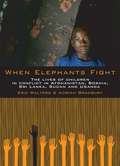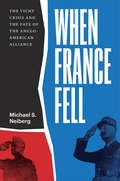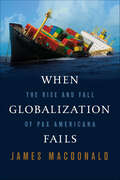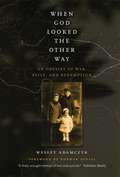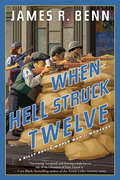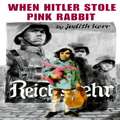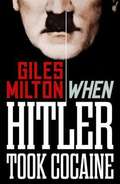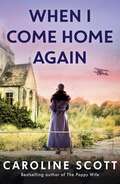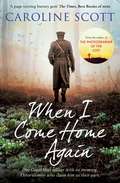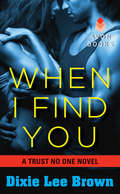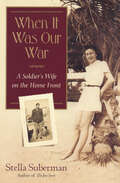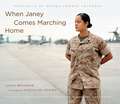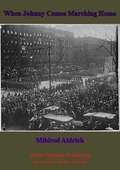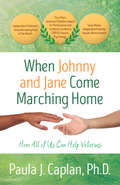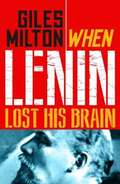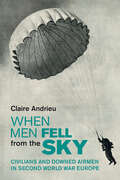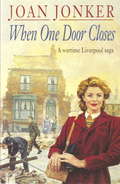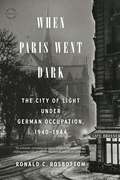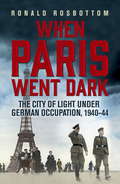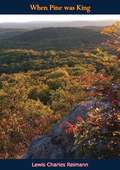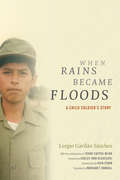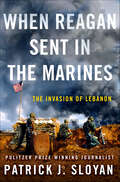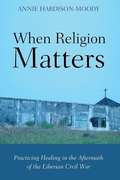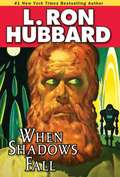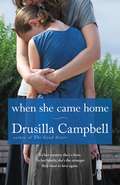- Table View
- List View
When Elephants Fight: The Lives of Children in Conflict in Afghanistan, Bosnia, Sri Lanka, Sudan and Uganda (Orca Books)
by Eric Walters Adrian BradburyBased on the eyewitness accounts of five children experiencing wars around the world, each chapter in this powerful volume tells one victim’s personal story in detail, followed by a long discussion of the history and politics of the conflict. The narratives are in the third person, accompanied by occasional moving photos of the child before the war, of his or her home under fire, and a brief final “follow-up” note about where the child is now. Some young people are direct targets in cases of genocide, with child soldiers trained to dehumanize others. Some children bear the brunt of an attack, as so-called collateral damage, and suffer starvation, disease, and loss of shelter. They also lose out when there are no resources for health and education. Some are in refugee camps and army barracks. A few lucky ones are immigrants who escaped. One, Toma in Chad, remains an ongoing victim of war. The harrowing individual accounts humanize today’s news reports and statistics.
When France Fell: The Vichy Crisis and the Fate of the Anglo-American Alliance
by Michael S. NeibergShocked by the fall of France in 1940, panicked US leaders rushed to back the Vichy government—a fateful decision that nearly destroyed the Anglo–American alliance. According to US Secretary of War Henry Stimson, the “most shocking single event” of World War II was not the Japanese attack on Pearl Harbor, but rather the fall of France in spring 1940. Michael Neiberg offers a dramatic history of the American response—a policy marked by panic and moral ineptitude, which placed the United States in league with fascism and nearly ruined the alliance with Britain. The successful Nazi invasion of France destabilized American planners’ strategic assumptions. At home, the result was huge increases in defense spending, the advent of peacetime military conscription, and domestic spying to weed out potential fifth columnists. Abroad, the United States decided to work with Vichy France despite its pro-Nazi tendencies. The US–Vichy partnership, intended to buy time and temper the flames of war in Europe, severely strained Anglo–American relations. American leaders naively believed that they could woo men like Philippe Pétain, preventing France from becoming a formal German ally. The British, however, understood that Vichy was subservient to Nazi Germany and instead supported resistance figures such as Charles de Gaulle. After the war, the choice to back Vichy tainted US–French relations for decades. Our collective memory of World War II as a period of American strength overlooks the desperation and faulty decision making that drove US policy from 1940 to 1943. Tracing the key diplomatic and strategic moves of these formative years, When France Fell gives us a more nuanced and complete understanding of the war and of the global position the United States would occupy afterward.
When Globalization Fails: The Rise and Fall of Pax Americana
by James MacDonaldThis sweeping history examines two centuries of global trade and warfare, shedding new light on the relationship between economics and conflict.In the nineteenth century, liberals exulted that the spread of commerce would usher in global prosperity and peace, but these dreams were dashed by imperial squabbles, the carnage of 1914–18, and the protectionism, depression, and conflict that followed. In the wake of World War II, the globalists tried again. With the Communist bloc disconnected from the global economy, a new international order was created, buttressing free trade with the informal supremacy of the United States. But this benign period is coming to an end.Expertly combining political, economic, and military history, James Macdonald argues that if industrial nations are more prosperous, they are also more vulnerable. While a dependence on trade may push toward cooperation, the attendant insecurity pulls in the opposite direction, leading to conflict.In Macdonald’s telling, World War I’s naval blockades were as important as its trenches, and World War II was a struggle for raw materials in a world that had rejected free trade. Today, the Pax Americana that kept insecurities at bay is being undermined by China’s rise, with potentially dangerous consequences. Rich in original historical analysis and enlivened by vivid quotation, When Globalization Fails recasts what we know about war, peace, and trade, and raises vital questions about the future.
When God Looked the Other Way: An Odyssey of War, Exile, and Redemption
by Wesley AdamczykOften overlooked in accounts of World War II is the Soviet Union's quiet yet brutal campaign against Polish citizens, a campaign that included, we now know, war crimes for which the Soviet and Russian governments only recently admitted culpability. Standing in the shadow of the Holocaust, this episode of European history is often overlooked. Wesley Adamczyk's gripping memoir, When God Looked the Other Way, now gives voice to the hundreds of thousands of victims of Soviet barbarism. Adamczyk was a young Polish boy when he was deported with his mother and siblings from their comfortable home in Luck to Soviet Siberia in May of 1940. His father, a Polish Army officer, was taken prisoner by the Red Army and eventually became one of the victims of the Katyn massacre, in which tens of thousands of Polish officers were slain at the hands of the Soviet secret police. The family's separation and deportation in 1940 marked the beginning of a ten-year odyssey in which the family endured fierce living conditions, meager food rations, chronic displacement, and rampant disease, first in the Soviet Union and then in Iran, where Adamczyk's mother succumbed to exhaustion after mounting a harrowing escape from the Soviets. Wandering from country to country and living in refugee camps and the homes of strangers, Adamczyk struggled to survive and maintain his dignity amid the horrors of war.When God Looked the Other Way is a memoir of a boyhood lived in unspeakable circumstances, a book that not only illuminates one of the darkest periods of European history but also traces the loss of innocence and the fight against despair that took root in one young boy. It is also a book that offers a stark picture of the unforgiving nature of Communism and its champions. Unflinching and poignant, When God Looked the Other Way will stand as a testament to the trials of a family during wartime and an intimate chronicle of episodes yet to receive their historical due.“Adamczyk recounts the story of his own wartime childhood with exemplary precision and immense emotional sensitivity, presenting the ordeal of one family with the clarity and insight of a skilled novelist. . . . I have read many descriptions of the Siberian odyssey and of other forgotten wartime episodes. But none of them is more informative, more moving, or more beautifully written than When God Looked the Other Way.”—From the Foreword by Norman Davies, author of Europe: A History and Rising ’44: TheBattleforWarsaw “A finely wrought memoir of loss and survival.”—Publishers Weekly “Adamczyk’s unpretentious prose is well-suited to capture that truly awful reality.” —Andrew Wachtel, Chicago Tribune Books “Mr. Adamczyk writes heartfelt, straightforward prose. . . . This book sheds light on more than one forgotten episode of history.”—Gordon Haber, New York Sun “One of the most remarkable World War II sagas I have ever read. It is history with a human face.”—Andrew Beichman, Washington Times
When Hell Struck Twelve (A Billy Boyle WWII Mystery #14)
by James BennIn the 14th Billy Boyle mystery, US Army detective Billy Boyle and Lieutenant Kazimierz travel into the heart of Nazi-occupied Paris on a dangerous mission: ensure a traitor to the French Resistance unwittingly carries out a high-stakes deception campaign. August, 1944: US Army detective Billy Boyle is assigned to track down a French traitor, code-named Atlantik, who is delivering classified Allied plans to German leaders in occupied Paris. The Resistance is also hot on his trail and out for blood, after Atlantik’s previous betrayals led to the death of many of their members. But the plans Atlantik carries were leaked on purpose, a ruse devised to obscure the Allied army’s real intentions to bypass Paris in a race to the German border. Now Billy and Kaz are assigned to the Resistance with orders to not let them capture the traitor: the deception campaign is too important. Playing a delicate game, the chase must be close enough to spur the traitor on and visible enough to ensure the Germans trust Atlantik. The outcome of the war may well depend on it.
When Hitler Stole Pink Rabbit
by Judith KerrRecounts the adventures of a nine-year-old Jewish girl and her family in the early 1930's as they travel from Germany to England.
When Hitler Took Cocaine
by Giles MiltonIn this marvellous collection of fascinating footnotes, Giles Milton delves into little-known stories from history. Covering everything from adventure, war, murder and slavery to espionage, including the stories of the real war horse, who killed Rasputin, Agatha Christie's greatest mystery and Hitler's English girlfriend, these tales deserve to be told.
When I Come Home Again: A beautiful and heartbreaking WWI novel, based on true events
by Caroline Scott**From the highly acclaimed author of The Photographer of the Lost, a BBC Radio 2 Book Club Pick** &‘A superb and quietly devastating novel about grief, hope and the horrific aftershocks of war&’ The Times, Book of the MonthThey need him to remember. He wants to forget. 1918. In the last week of the First World War, a uniformed soldier is arrested in Durham Cathedral. When questioned, it becomes clear he has no memory of who he is or how he came to be there. The soldier is given the name Adam and transferred to a rehabilitation home. His doctor James is determined to recover who this man once was. But Adam doesn&’t want to remember. Unwilling to relive the trauma of war, Adam has locked his memory away, seemingly for good. When a newspaper publishes a feature about Adam, three women come forward, each claiming that he is someone she lost in the war. But does he believe any of these women? Or is there another family out there waiting for him to come home?Based on true events, When I Come Home Again is a deeply moving and powerful story of a nation&’s outpouring of grief, and the search for hope in the aftermath of war. Praise for When I Come Home Again: 'Breathtaking exploration of loss, love and precious memories&’ My Weekly, Pick of the Month &‘A heartbreaking read which reveals the far-reaching tragedies of war… I highly recommend it&’ Anita Frank &‘Caroline Scott&’s quietly devastating second novel insightfully explores the impact of the Great War on returning soldiers and their families' S Magazine &‘A powerful story that&’s achingly moving and most beautifully written. Readers of Maggie O&’Farrell and Helen Dunmore are likely to enjoy&’ Rachel Hore &‘Powerful… A carefully, nuanced, complex story&’ Woman & Home 'This beautiful and moving book drew me in from the first line and held me enthralled until the very end' Fiona Falpy &‘An evocative read&’heat 'A compulsive, heart-wrenching read' Liz Trenow &‘Scott litters her tale with clues and red herrings in the best mystery-writer way so we are kept guessing as to where the truth really lies&’ The BookBag 'Page turning, mysterious, engrossing and compelling' Lorna Cook &‘Caroline Scott evokes the damage and desolation of the Great War with aching authenticity' Iona Grey 'Wonderful and evocative' Suzanne Goldring &‘A beautifully written novel – immersive, poignant, intricately woven&’ Judith Kinghorn &‘The story left me breathless. Powerful, heartrending, and oh so tender. A whirlwind of emotions that will not allow us to forget&’ Kate Furnivall
When I Come Home Again: A beautiful and heartbreaking WWI novel, based on true events
by Caroline Scott**From the highly acclaimed author of The Photographer of the Lost, a BBC Radio 2 Book Club Pick** &‘A superb and quietly devastating novel about grief, hope and the horrific aftershocks of war&’ The Times, Book of the MonthThey need him to remember. He wants to forget. 1918. In the last week of the First World War, a uniformed soldier is arrested in Durham Cathedral. When questioned, it becomes clear he has no memory of who he is or how he came to be there. The soldier is given the name Adam and transferred to a rehabilitation home. His doctor James is determined to recover who this man once was. But Adam doesn&’t want to remember. Unwilling to relive the trauma of war, Adam has locked his memory away, seemingly for good. When a newspaper publishes a feature about Adam, three women come forward, each claiming that he is someone she lost in the war. But does he believe any of these women? Or is there another family out there waiting for him to come home?Based on true events, When I Come Home Again is a deeply moving and powerful story of a nation&’s outpouring of grief, and the search for hope in the aftermath of war. Praise for When I Come Home Again: &‘A heartbreaking read which reveals the far-reaching tragedies of war… I highly recommend it&’ Anita Frank &‘Caroline Scott&’s quietly devastating second novel insightfully explores the impact of the Great War on returning soldiers and their families' S Magazine &‘A powerful story that&’s achingly moving and most beautifully written. Readers of Maggie O&’Farrell and Helen Dunmore are likely to enjoy&’ Rachel Hore &‘Powerful… A carefully, nuanced, complex story&’ Woman & Home 'Page turning, mysterious, engrossing and compelling' Lorna Cook 'A compulsive, heart-wrenching read' Liz Trenow &‘Caroline Scott evokes the damage and desolation of the Great War with aching authenticity' Iona Grey 'This beautiful and moving book drew me in from the first line and held me enthralled until the very end' Fiona Falpy 'Wonderful and evocative' Suzanne Goldring &‘A beautifully written novel – immersive, poignant, intricately woven&’ Judith Kinghorn &‘Scott litters her tale with clues and red herrings in the best mystery-writer way so we are kept guessing as to where the truth really lies&’ The BookBag
When I Find You: A Trust No One Novel
by Dixie Lee BrownDixie Lee Brown continues her heart-racing Trust No One series with a sexy veteran determined to protect an innocent woman on the run. As a former Marine, Walker could find a needle in a haystack. But when hes asked by the U. S. Marshals to track down a nanny fleeing from the mafia, hes sure shell be more trouble than shes worth. Especially after the sexy little thing clubs him and leaves him for dead. Walkers stunned by her courage--and her curves--and cant help feeling drawn to this damsel trying to dig her way out of distress. Hell find her, and when he does, itll take more than the mafia to tear him away. Darcy Maddox never expected to be running for her life. But when it suddenly looks like foe may become friend, Darcys faced with a choice: Go it alone or trust a man she just met--never mind the way his touch gets her heart pounding. The choice seems simple enough until she realizes its not just her life at stake--its her heart.
When It Was Our War: A Soldier's Wife on the Home Front
by Stella SubermanWhen Stella Suberman wrote her first memoir, The Jew Store, at the age of seventy-six, she was widely praised for shedding light on a forgotten piece of American history--Jewish life in the rural South. In her new memoir, Suberman reveals yet another overlooked aspect of America's past--the domestic side of war. Her story begins in the Miami Beach she grew up in, when hotel signs boasted "Always a View, Never a Jew" and where a passenger ship lingered just off shore carrying hundreds of European Jews hoping for--but never finding--sanctuary. It was a time of innocence, before that war in Europe became our war. Stella was nineteen when America entered the fighting. By the time she was twenty-three, the war was over. She married Jack Suberman the week he enlisted and set out alone to join him in California. She was kicked off trains to make room for soldiers, her luggage was stolen, she was arrested for soliciting, but she was determined to follow her husband. And she did so for the next four years as he was sent from air base to air base, first training to be a bombardier and then training others. It wasn't until he was sent overseas to fly combat missions that she finally went back home to wait, as did so many other soldier's wives. This remarkable memoir renders a double understanding of war--of how it matured a young woman and how it matured a country. By personalizing the patriotism of the 1940s, Stella Suberman's story becomes the story of all military wives and serves as a powerful reminder of how differently many Americans feel about war sixty years later.
When Janey Comes Marching Home
by Laura Browder Sascha PflaegingWhile women are officially barred from combat in the American armed services, in the current war, where there are no front lines, the ban on combat is virtually meaningless. More than in any previous conflict in our history, American women are engaging with the enemy, suffering injuries, and even sacrificing their lives in the line of duty.When Janey Comes Marching Home juxtaposes forty-eight photographs by Sascha Pflaeging with oral histories collected by Laura Browder to provide a dramatic portrait of women at war. Women from all five branches of the military share their stories here--stories that are by turns moving, comic, thought-provoking, and profound. Seeing their faces in stunning color photographic portraits and reading what they have to say about loss, comradeship, conflict, and hard choices will change the ways we think about women and war. Serving in a combat zone is an all-encompassing experience that is transformative, life-defining, and difficult to leave behind. By coming face-to-face with women veterans, we who are outside that world can begin to get a sense of how the long wars in Iraq and Afghanistan have shaped their lives and how their stories may ripple out and influence the experiences of all American women.The book accompanies a photography exhibit of the same name opening May 1, 2010, at the Women in Military Service to America Memorial at Arlington National Cemetery, and continuing to travel around the country through 2011.
When Johnny Comes Marching Home
by Mildred AldrichMildred Aldrich was born in Providence, Rhode Island, in 1853. After graduating from Everett High School in 1872, she taught elementary school in Boston, Massachusetts.Aldrich began her career as a journalist with the Boston Home Journal and later contributed to Arena and the Boston Herald. For a short period in 1892, she also edited the magazine, The Mahogany Tree.In 1898, Aldrich moved to France and while living in Paris became a close friend of Gertrude Stein. Aldrich worked as a foreign correspondent and newspaper critic until retiring to Huiry, a village on the outskirts of Paris. She wrote to Stein in June 1914: "It will be the bloodiest affair the world has ever seen - a war in the air, under the sea as well as on it, and carried out with the most effective man-slaughtering machines ever used in battle."During the First World War, Aldrich wrote A Hilltop on the Marne (1915), a book based on her journal entries (3rd June - 8th September 1914) and on letters she wrote to Gertrude Stein. The book sold well in the United States and she followed it with On the Edge of the War Zone (1917), The Peak of the Load (1918) and When Johnny Comes Marching Home (1919).The French government believed that Aldrich's work helped persuade the US government to declare war on Germany and in 1922 was awarded the Legion of Honour.Mildred Aldrich died in Huiry, France, on 19th February, 1928.Text taken, whole and complete, from the edition published in Boston, Small, Maynard and Company, 1919.Original Page Count - 286 pages.
When Johnny and Jane Come Marching Home: How All of Us Can Help Veterans
by Ph.D. Paula J. CaplanWhy are those devastated by war or other military experiences called mentally ill? The standard treatment of therapy and drugs can actually be harmful, and huge numbers of suffering veterans from earlier eras demonstrate its inadequacy. Most of us are both war-illiterate and military-illiterate. Caplan proposes that we welcome veterans back into our communities and listen to their experiences, one-on-one. Beginning a long overdue national discussion about the realities of war and the military will help us bridge the dangerous chasms between veterans and nonveterans.
When Lenin Lost His Brain
by Giles MiltonIn this marvellous collection of fascinating footnotes, Giles Milton delves into the little-known stories from history. Covering everything from adventure, war, murder and slavery to espionage, including the stories of the female Robinson Crusoe, Hitler's final hours, Japan's deadly balloon bomb and the emperor of the United States, these tales deserve to be told.
When Men Fell from the Sky: Civilians and Downed Airmen in Second World War Europe (Studies in the Social and Cultural History of Modern Warfare)
by Claire AndrieuBetween 1940 and 1945, more than 100,000 airmen were shot down over Europe, a few thousand of whom survived and avoided being arrested. When Men Fell from the Sky is a comparative history of the treatment of these airmen by civilians in France, Germany and Britain. By studying the situation on the ground, Claire Andrieu shows how these encounters reshaped societies at a local level. She reveals how the fall of France in 1940 may have concealed an insurrection nipped in the bud, that the 'People's War' in Britain was not merely a myth, and that in Germany, the 'racial community of the people' had in fact become a social reality with Allied airmen increasingly subjected to lynching from 1943 onwards. By considering why the treatment of these airmen contrasted so strongly in these countries, Andrieu sheds new light on how civilians reacted when confronted with the war 'at home'.
When One Door Closes: A heart-warming saga of love and friendship in a city ravaged by war (Eileen Gillmoss series, Book 1)
by Joan JonkerWith the powerful aid of friendship, a young woman learns to love again after the tragedies of the Second World War. Joan Jonker's first instalment of the Eileen Gillmoss series, When One Door Closes, is a heart-warming saga of love and laughter in the direst of circumstances, and promises to be an unforgettable tale. Perfect for fans of Katie Flynn and Dilly Court.It's May 1941 and Liverpool is taking a hammering from the German bombers. For young Mary Bradshaw and her widowed mother life is full of rationing, blackouts and the wail of the air-raid siren. Despite the gloom, Mary's heart is light as she counts her blessings - she's got her loving mother and Bob, her soldier boyfriend whom she adores and hopes to marry soon. During the worst air raid Liverpool has ever suffered, fate deals Mary the first of many cruel blows it has in store for her. She is devastated as her whole world collapses. But Mary doesn't have to face the knocks alone. Her best friend Eileen has a heart and a sense of humour as big as her eighteen stone body - heaven help anyone who hurts her mate! Harry is the boy from up the road who's loved Mary since they were kids and he'll not desert her now. Soon Mary finds that when one door closes, another one really does open. What readers have been saying about When One Door Closes: 'This is the first Joan Jonker book I have read and it is one of the best books I have ever read. It is a warm-hearted story set in Liverpool during the blitz. The characters draw you in and you feel as if you know them''A warm hearted, captivating story of life in Liverpool during the blitz. You feel as though you are actually involved in the story, as the characters are so warm and friendly - a totally absorbing read'
When Paris Went Dark: The City of Light Under German Occupation, 1940-1944
by Ronald C. RosbottomThe spellbinding and revealing chronicle of Nazi-occupied Paris On June 14, 1940, German tanks entered a silent and nearly deserted Paris. Eight days later, France accepted a humiliating defeat and foreign occupation. Subsequently, an eerie sense of normalcy settled over the City of Light. Many Parisians keenly adapted themselves to the situation-even allied themselves with their Nazi overlords. At the same time, amidst this darkening gloom of German ruthlessness, shortages, and curfews, a resistance arose. Parisians of all stripes-Jews, immigrants, adolescents, communists, rightists, cultural icons such as Colette, de Beauvoir, Camus and Sartre, as well as police officers, teachers, students, and store owners-rallied around a little known French military officer, Charles de Gaulle. WHEN PARIS WENT DARK evokes with stunning precision the detail of daily life in a city under occupation, and the brave people who fought against the darkness. Relying on a range of resources---memoirs, diaries, letters, archives, interviews, personal histories, flyers and posters, fiction, photographs, film and historical studies---Rosbottom has forged a groundbreaking book that will forever influence how we understand those dark years in the City of Light.
When Paris Went Dark: The City of Light Under German Occupation, 1940-44
by Ronald RosbottomIn May and June 1940 almost four million people fled Paris and its suburbs in anticipation of a German invasion. On June 14, the German Army tentatively entered the silent and eerily empty French capital. Without one shot being fired in its defence, the Occupation of Paris had begun. When Paris Went Dark tells the extraordinary story of Germany's capture and Occupation of Paris, Hitler's relationship with the City of Light, and its citizens' attempts at living in an environment that was almost untouched by war, but which had become uncanny overnight. Beginning with the Phoney War and Hitler's first visit to the city, acclaimed literary historian and critic Ronald Rosbottom takes us through the German Army's almost unopposed seizure of Paris, its bureaucratic re-organization of that city, with the aid of collaborationist Frenchmen, and the daily adjustments Parisians had to make to this new oppressive presence. Using memoirs, interviews and published eye-witness accounts, Rosbottom expertly weaves a narrative of daily life for both the Occupier and the Occupied. He shows its effects on the Parisian celebrity circles of Pablo Picasso, Simone de Beauvoir, Colette, Jean Cocteau, and Jean-Paul Sartre, and on the ordinary citizens of its twenty arrondissements. But Paris is the protagonist of this story, and Rosbottom provides us with a template for seeing the City of Light as more than a place of pleasure and beauty.
When Pine was King
by Lewis Charles ReimannLewis Reimann was the son of German immigrants who ran a boarding-house for miners and loggers in the Iron River district of Michigan’s Upper Peninsula. When Lewis C. Reimann brought out his volume of reminiscences of early life in Michigan’s Upper Peninsula in 1951, Between The Iron and the Pine, consisting of the author’s recollections with anecdotes and historical commentary about the region, he thought of it mostly as a labor of love in connection with a centennial at Iron River, his birthplace. Reimann conveyed a sense of the occupational lifestyles and multiple ethnicities of Iron River’s inhabitants and dealt in some detail with its folklore, material culture, foodways, and memorable local characters.Between The Iron and the Pine enjoyed such a wide success that it was as surprising as it was gratifying to its author—and it was only natural that he should write a sequel.This book, When Pine Was King, first published in 1952, with its locale in the semi-wilderness land across the Straits of Mackinac, treats of the early days of the Upper Peninsula when men were men and every lumberjack could lick his weight in wildness…or thought he could.Another gripping read from Lewis Charles Reimann.
When Rains Became Floods: A Child Soldier’s Story
by Margaret Randall Lurgio Gavilán SánchezWhen Rains Became Floods is the gripping autobiography of Lurgio Gavilán Sánchez, who as a child soldier fought for both the Peruvian guerrilla insurgency Shining Path and the Peruvian military. After escaping the conflict, he became a Franciscan priest and is now an anthropologist. Gavilán Sánchez's words mark otherwise forgotten acts of brutality and kindness, moments of misery and despair as well as solidarity and love.
When Reagan Sent in the Marines: The Invasion of Lebanon
by Patrick J. Sloyan"In this formidable narrative, the prize-winning and super honest reporter, Patrick Sloyan, adds the depth of a scholar's context to produce a gripping reminder of why we should never forget history. He makes readers feel like they were eye witnesses." —Ralph NaderFrom a Pulitzer Prize-winning journalist who reported on the events as they happened, an action-packed account of Reagan's failures in the 1983 Marines barracks bombing in Beirut. On October 23, 1983, a truck bomb destroyed the U.S. Marines barracks in Beirut. 241 Americans were killed in the worst terrorist attack our nation would suffer until 9/11. We’re still feeling the repercussions today.When Reagan Sent In the Marines tells why the Marines were there, how their mission became confused and compromised, and how President Ronald Reagan used another misguided military venture to distract America from the attack and his many mistakes leading up to it.Pulitzer Prize-winning author Patrick J. Sloyan uses his own contemporaneous reporting, his close relationships with the Marines in Beirut, recently declassified documents, and interviews with key players, including Reagan’s top advisers, to shine a new light on the Israeli invasion of Lebanon and Reagan’s doomed ceasefire in Beirut. Sloyan draws on interviews with key players to explore the actions of Kissinger and Haig, while revealing the courage of Marine Colonel Timothy Geraghty, who foresaw the disaster in Beirut, but whom Reagan would later blame for it.More than thirty-five years later, America continues to wrestle with Lebanon, the Marines with the legacy of the Beirut bombing, and all of us with the threat of Mideast terror that the attack furthered. When Reagan Sent In The Marines is about a historical moment, but one that remains all too present today.
When Religion Matters: Practicing Healing in the Aftermath of the Liberian Civil War
by Annie Hardison-MoodyIn this book, Hardison-Moody argues that religion matters for many survivors of violence, and that this fact must be taken into account in international conversations about women, violence, and healing. Consequently, she looks beyond the institutional forms of religion, instead studying the ways women live and profess healing and transformation as a part of their everyday lives. This book expands our imagination by bringing to light the distinctiveness of the transformational work accomplished by women victimized by war.
When Shadows Fall
by L. Ron HubbardExplore exotic new worlds. In a future where Mother Earth has cast her children to the distant stars to begin anew and colonize the cosmos, the planet remains depleted of natural resources. Its air polluted by caustic iron and belching smoke, Earth faces her last desperate days in the grip of global environmental collapse.In one final and feeble effort, Earth's Grand President Makin musters the dregs of his fleet and sends three separate missions to the deepest reaches of space. Their mission: solicit help from the far-flung colonial civilizations, or watch the planet die. ALSO INCLUDES THE SCIENCE FICTION STORIES "TOUGH OLD MAN" AND "BATTLING BOLTO""Hubbard was a first-rate pulp writer." --Locus Magazine
When She Came Home
by Drusilla CampbellWHEN SHE CAME HOMEFrankie Byrne Tennyson stunned everyone when she decided to enlist in the U.S. Marine Corps. Now-after bravely serving her country in Iraq-she's finally come home. Home to a husband whose lingering feelings of abandonment make her wonder if their lives can ever be the same. Home to a daughter whose painful encounters with bullies can only be healed by a mother's love. And home to a father who still can't accept his daughter's decision to serve in spite of his own stellar career as a brigadier general. But the most difficult part about coming home lies within Frankie herself. To save everything she holds dear, she must face the toughest battle of her life . . . A moving portrait of a modern American family, WHEN SHE CAME HOME reminds us that some things-honor, acceptance, and, above all, love-are truly worth fighting for.
